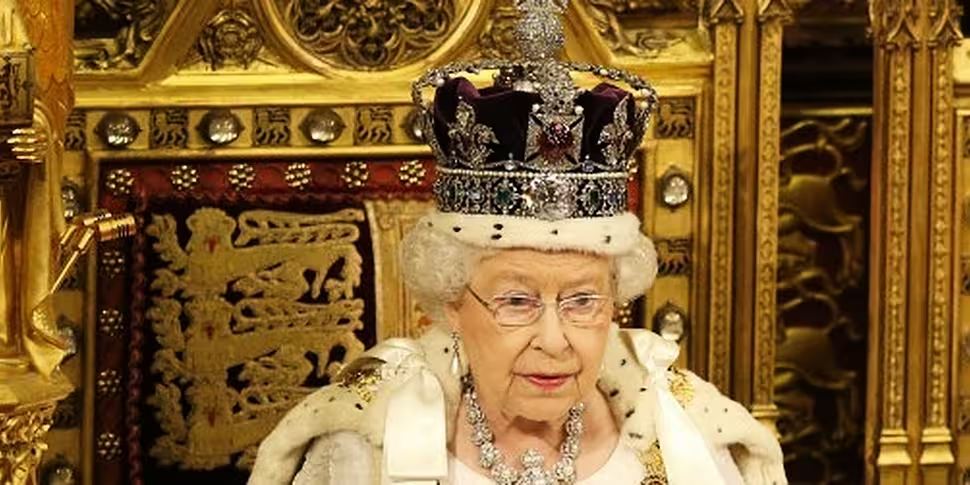Donald Trump's state visit to Britain appears to have been postponed, as it has been left out of a speech officially opening the new parliament.
The address by Britain's Queen Elizabeth II traditionally includes planned state visits, but the UK government's programme for the next two years only contained a reference to welcoming King Felipe and Queen Letizia of Spain in July.
In January, Downing Street said Mr Trump's visit to Britain was just "months away", with reports later suggesting it had been scheduled for October.
However, Mr Trump reportedly told British Prime Minister Theresa May in a call that he did not want to go ahead with the trip if was likely to cause widespread demonstrations.
A spokesman for Mrs May said the visit was not included in the Queen's Speech "because a date hasn't been fixed yet".
Mrs May extended an invitation to Mr Trump just a week after his inauguration in January, during a visit to the White House.
Queen Elizabeth II announced 27 bills and draft bills as she revealed the legislative agenda to the British parliament.
These included several in relation to Britain's exit from the European Union, including a Great Repeal Bill, Customs Bill, Immigration Bill, Agriculture Bill and Nuclear Safeguards Bill.
British Prime Minister Theresa May walks through the Palace of Westminster to the House of Lords in London | Image: Niklas Halle'n/PA Wire/PA Images
All these areas are currently linked with EU legislation, which will have to be undone.
- Great Repeal Bill - A huge piece of planned legislation that aims to replicate all existing EU law into British law by the time of Britain’s departure from the EU
- Customs Bill - Legislation is required to implement a new customs regime as Britain leaves the EU's Customs Union
- Trade Bill - By leaving the Customs Union, Britain will be allowed to sign free trade deals with non-EU countries. This bill aims to put in place the legal framework for the UK to sign any possible deals
- Immigration Bill - This will aim to implement a new immigration policy for EU nationals as EU freedom of movement rules will no longer apply
- Fisheries Bill - Leaving the EU could see Britain quit the bloc’s Common Fisheries Policy. Legislation will be needed for the UK to manage its waters
- Agriculture Bill - The UK's departure from the EU’s Common Agricultural Policy will similarly see new laws needed to manage farmland and the environment
- Nuclear Safeguards Bill - Another area in which new powers will be needed once Britain leaves the EU, with international safeguards required to be put in place once the UK quits the bloc's Euratom organisation
- International Sanctions Bill - Britain currently places international sanctions on other countries through the European Council, but will need new legislation to take such decisions outside the EUThe speech, which is written by the British government but delivered by Queen Elizabeth II, also made reference to plans to seek a "special partnership with European allies" in relation to Brexit.
There was also a pledge to work with all the parties in Northern Ireland to see devolved government restored at Stormont, and for a full public inquiry into the Grenfell Tower fire in London.
As well as this, the national living wage there is to be increased.
The UK's Counter-terrorism strategy is also to be reviewed, in light of recent terror attacks in London and Manchester.
What was not in it?
Mrs May put forward the Brexit-heavy programme, with many noting several other aspects had been scrapped.
Gone is her "transformative" programme to re-introduce grammar schools, end free school meals for primary school children, hold a vote on fox-hunting, scrap the triple lock on pensions and means test the winter fuel allowance.
Mrs May has also had to significantly water down the central plank of her manifesto - social care reform.
There is also no mention of her energy market reform to bring down consumers' bills, although Downing Street could try to push that as a non-legislative measure.
Even with the support of the DUP (the deal is yet to be done), the Prime Minister will only have a working majority of 12, leaving her with a huge task to pass the Queen's Speech through both the Commons and Lords.
It comes as Mrs May is yet to clinch a deal with the Democratic Unionist Party (DUP) to prop up her minority government.
It has been revealed that talks between the DUP and the Conservative Party "haven't proceeded in a way that DUP would have expected".
The party is urging the UK government to give "greater focus" to negotiations, with a warning that it "can't be taken for granted".
Mrs May will need the DUP to back her legislative programme when it goes to a vote next week in order to stay in power.
But even with the support of the DUP, she will only have a working majority of 12 - leaving her with a big task to pass the speech through both the House of Commons and House of Lords.
Additional reporting: Jack Quann










